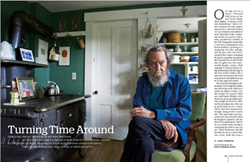Poets & Writers Magazine welcomes letters from its readers. Please post a comment on select articles at www.pw.org/magazine, e-mail editor@pw.org, or write to Editor, Poets & Writers Magazine, 90 Broad Street, Suite 2100, New York, NY 10004. Letters accepted for publication may be edited for clarity and length.
Turning Time Around
After reading John Freeman’s wonderful profile of Donald Hall (“Turning Time Around,” November/December 2014), I was moved to write about my experience sitting in on his Introduction to Poetry class at the University of Michigan in the fall of 1968. What a dynamic and challenging teacher he was. He began by stating his approach to poetry (I’m paraphrasing): Poetry is an appeal to primary urges and sensations; intellectualism provides a framework, an approach to poetry, but good poetry must appeal to the basic senses. He then offered this rationale for the course: Poetry yields pleasure; pleasure is a good, worthwhile thing; and deeper understanding comes from exposure  to a variety of poems. The statement that Donald Hall made that meant the most to me then, as now, is this: “The struggle of the poet is to reach the natural sensations, emotions, and feelings that are often concealed or hidden by the mechanisms of civilization.” Amen to that thought, and God bless Donald Hall!
to a variety of poems. The statement that Donald Hall made that meant the most to me then, as now, is this: “The struggle of the poet is to reach the natural sensations, emotions, and feelings that are often concealed or hidden by the mechanisms of civilization.” Amen to that thought, and God bless Donald Hall!
David Vaughn
Waynesville, Ohio
I loved the profile of Donald Hall. I fell in love with Hall’s work in 1983, during my second year of college, while my girlfriend and I were traveling to Florida for spring break. During the trip I started reading Hall’s String Too Short to Be Saved (1961). I cried all the way to Florida—it was that touching and beautiful—and I’ve been a fan ever since. I actually had a chance to meet him when he came to speak at the University of Maine. I was expecting a god. I met a man who was funny, charming, and friendly. It is good to know that he has not changed.
Daniel L. Austin
Friendship, Maine
Declaration of Independents
I really enjoyed “Let’s Just Do This: Eleven Small-Press Authors and Their Publishing Partners” by Kevin Larimer (November/December 2014), and loved reading about each publisher’s mission. It was interesting to note how some of the books mentioned could have easily been placed into the speculative fiction category (Shane Jones’s Crystal Eaters, published by Two Dollar Radio, for example). But neither the publishers nor the writers mentioned it, which proves to me, once again, that speculative fiction and its genre-fiction siblings are still the red-haired stepchildren of the literary world. But there are many quality small presses and independent publishers out there that publish speculative fiction and openly acknowledge it.
Rachel Olivier
Los Angeles, California
From Twitter:
Love this issue of @poetswritersinc, and all of these indie publishers and incredible authors who found homes with them. Inspired.
Gina Sorell
@ginasorell
Lovely profile of the endlessly energetic and inspiring @meganstielstra and @curbsidepress in the new @poetswritersinc—w00t w00t!
Shawn Syms
@shawnsyms
Very cool to see indie writers and publishers featured in the latest @poetswritersinc.
Gigantic Sequins
@giganticsequins
Eleven Kinds of Awesome: @poetswritersinc feature on fab small press authors and their hardworking publishers.
Sara Lippmann
@saralippmann






